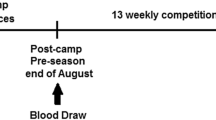Abstract
The National Collegiate Athletic Association (NCAA) requires all student-athletes have their sickle cell trait (SCT) status confirmed prior to athletic participation. The NCAA approved the screening program in 2010 for institutions participating in Division I athletics and extended it in subsequent years to institutions at Division II and III levels. Ethical concerns about the controversial policy focus on its mandatory nature and potential impact on student-athletes, particularly through stigmatization of and discrimination against those with SCT. Organizations, such as the American Society of Hematology (ASH), oppose the imposition of SCT testing and instead recommend universal precautions that would protect the entire student-athlete population without revealing student-athletes’ SCT statuses. This paper discusses these issues and offers recommendations, including genetic counseling, which would improve the current SCT screening program. It argues that implementation of universal precautions would ensure that the most ethically sound practices are afforded to every student-athlete.
Similar content being viewed by others
References
Aloe, A., Krishnamurti, L., & Kladny, B. (2011). Testing of collegiate athletes for sickle cell trait: what we, as genetic counselors should know. Journal of Genetic Counseling, 20, 337–340.
Ashley-Koch, A., Yang, Q., & Olney, R. (2000). Sickle hemoglobin (Hb S) allele and sickle cell disease: a huge review. American Journal of Epidemiology, 151, 839–845.
Bonham, V., Dover, G., & Lawrence, B. (2010). Screening student-athletes for sickle cell trait – a social and clinical experiment. The New England Journal of Medicine, 363, 997–999.
Gardner, J., & Kark, J. (1994). Fatal rhabdomyolysis presenting as mild heat illness in military training. Military Medicine, 159, 160–163.
Grant, A., Parker, C., Jordan, L., Hulihan, M., Creary, M., Lloyd-Puryear, M., Goldsmith, J., & Atrash, H. (2011). Public health implications of sickle cell trait a report of the CDC meeting. American Journal of Preventive Medicine, 41, 435–439.
Greenbaum, D. (2012). Introducing personal genomics to college athletes: potentials and pitfalls. The American Journal of Bioethics, 12, 45–47.
Greenfield, B., & West, C. (2012). Ethical issues in sports medicine. Sports Health, 4, 475–479.
Grubs, R., Parker, S., & Hamilton, R. (2014). Subtle psychosocial sequelae of genetic test results. Current Genetic Medicine Reports, 2, 242–249.
Harmon, K., Asif, I., Klossner, D., & Drezner, J. (2011). Incidence of sudden cardiac death in National Collegiate Athletic Association athletes. Circulation, 123, 1594–1600.
Kessler, S. (1997). Psychological aspects of genetic counseling: teaching and counseling. Journal of Genetic Counseling, 6, 287–295.
Klossner, D. (2013). NCAA Sports Medicine Handbook, 2013–2014. Retrieved from http://www.ncaapublications.com/p-4328-2013-14-ncaa-sports-medicine-handbook.aspx.
Lawrence, R., & Shah, G. (2014). Athletes’ perceptions of National Collegiate Athletic Association-mandated sickle cell trait screening: insight for academic institutions and college health professionals. Journal of American College Health, 62, 343–350.
Natowicz, M., & Alper, J. (1991). Genetic screening: triumphs, problems, and controversies. Journal of Public Health Policy, 12, 475–491.
Nelson, S. (2012). Scaring athletes with sickle cell trait. The American Journal of Cardiology, 111, 149.
Tarini, B., Brooks, M., & Bundy, D. (2012). A policy impact analysis of the mandatory NCAA sickle cell trait screening program. Health Services Research, 47, 446–461.
Thompson, A. (2013). Sickle cell trait testing and athletic participation: a solution in search of a problem? Hematology, 2013, 632–637.
Tsaras, G., Owusu-Ansah, A., Boateng, F., & Amoateng-Adjepong, Y. (2009). Complications associated with sickle cell trait: a brief narrative review. The American Journal of Medicine, 122, 507–512.
Author information
Authors and Affiliations
Corresponding author
About this article
Cite this article
Ferrari, R., Parker, L.S., Grubs, R.E. et al. Sickle Cell Trait Screening of Collegiate Athletes: Ethical Reasons for Program Reform. J Genet Counsel 24, 873–877 (2015). https://doi.org/10.1007/s10897-015-9849-1
Received:
Accepted:
Published:
Issue Date:
DOI: https://doi.org/10.1007/s10897-015-9849-1




